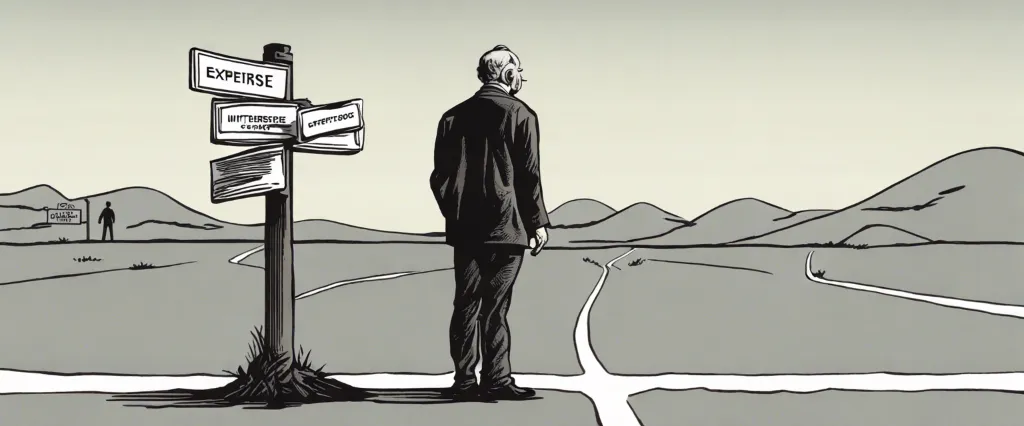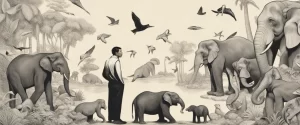——The Death of Expertise by Thomas M. Nichols & The Social Animal by Elliot Aronson

In an era marked by the proliferation of information and the democratization of knowledge, questions about the role of experts and the dynamics of social influence have become increasingly relevant. Two books that delve deeply into these themes are “The Death of Expertise” by Thomas M. Nichols and “The Social Animal” by Elliot Aronson. While both authors explore the complex interplay between individuals and society, they approach the subject matter from two distinct angles.
The Death of Expertise serves as a sharp critique of modern society’s growing disdain for expertise and factual knowledge. Nichols, a professor of national security affairs, examines the societal factors that have propelled this anti-expertise sentiment, highlighting the dangers it poses to democracy, public decision-making, and even personal self-improvement. Challenging the prevailing skepticism towards experts that has emerged in recent years, Nichols presents a forceful argument for the importance of intellectual humility, the recognition of expertise, and the necessity of informed public discourse.
On the other hand, “The Social Animal” takes a more psychological approach to understanding human behavior within a social context. Aronson, one of the pioneers of social psychology, explores the profound impact of our social interactions on shaping our thoughts, feelings, and actions. Through a captivating blend of science, storytelling, and personal anecdotes, Aronson reveals the hidden forces that influence our perceptions and decision-making processes. By shedding light on the powerful role of social influence, he prompts readers to question the extent of their individual agency and emphasizes the need for critical thinking in navigating the complex web of societal pressures.
While both Nichols and Aronson tackle the broad issue of knowledge acquisition and its susceptibility to external influences, their perspectives diverge in important ways. Nichols concentrates on the erosion of expertise and factual authority, pinpointing how this trend hampers the functioning of our democratic systems. In contrast, Aronson focuses on the internal biases and social forces that shape our perceptions and choices, drawing attention to the malleability of human behavior.
Through this comparative study, we aim to explore the various intersections between these two intellectually stimulating books. By engaging with the arguments put forth by Nichols and Aronson, we hope to gain a deeper understanding of the challenges faced by experts in the modern age and unravel the intricate web of social influence that governs our lives. Ultimately, this endeavor seeks to enrich our appreciation for the profound complexities surrounding knowledge acquisition, individual autonomy, and the dynamics of social interaction.
Brief Summary of Two Books
The Death of Expertise by Thomas M. Nichols
“The Death of Expertise” by Thomas M. Nichols explores the decline of respect for experts and the consequences of this trend in contemporary society. Nichols argues that in the age of the internet and information explosion, everyone has the ability to access any kind of information they want, leading to a false sense of knowledge and expertise. This mindset erodes public trust in actual experts, as people increasingly rely on their own opinions rather than deferring to those with proven knowledge in a particular field. Nichols examines various factors contributing to this phenomenon, including the rise of anti-intellectualism, political polarization, and the oversimplification of complex issues. He also critiques social media platforms for amplifying this problem by promoting echo chambers and permitting the spread of misinformation. Ultimately, Nichols calls for a revival of respect for expertise and suggests strategies for combating the death of expertise, emphasizing the importance of critical thinking, humility, and ongoing education.
The Social Animal by Elliot Aronson
The Social Animal” is a book written by Elliot Aronson that explores the complexities of human behavior and social influence. The book delves into various psychological concepts, theories, and experiments to shed light on how people think, feel, and interact with each other.
Aronson takes a narrative approach in presenting his ideas, narrating the life story of a fictional character named Harold, from childhood to adulthood. Through Harold’s experiences, the reader is introduced to the field of social psychology and its fundamental principles.
The book addresses various topics, including the power of social conformity, the influence of culture and society on individuals, the role of cognitive dissonance in decision-making, and the impact of prejudice and discrimination. Aronson explores how these factors shape people’s behavior, beliefs, and attitudes, often without conscious awareness.
“The Social Animal” also emphasizes the importance of social connections and relationships in determining happiness and well-being. Aronson emphasizes the significance of empathy, compassion, and understanding in fostering healthy and satisfying social interactions.
Ultimately, Aronson’s book provides a comprehensive overview of social psychology, revealing how individuals are influenced by their social environment and highlighting the profound impact of social relationships on human behavior and well-being.
Comparison between Two Books

Similarities in Social Psychology
Both “The Death of Expertise” by Thomas M. Nichols and “The Social Animal” by Elliot Aronson touch upon various aspects of social psychology. While the overall themes and messages of the books differ, they do share several similarities when it comes to their exploration of social psychology.
1. Influence of cognitive biases: Both books discuss the impact of cognitive biases on human perception and decision-making. “The Death of Expertise” highlights the tendency for individuals to rely on their personal beliefs and anecdotal evidence instead of expert opinions, which aligns with cognitive biases such as confirmation bias and availability heuristic. Similarly, “The Social Animal” acknowledges the role of biases in shaping our attitudes and behavior, emphasizing the need for critical thinking and awareness of these biases.
2. Power of social influence: Both authors emphasize the significance of social influence in shaping individuals’ beliefs and actions. “The Death of Expertise” sheds light on how social media and political polarization can amplify echo chambers and diminish the role of experts, leading to a larger impact of social influence on public opinion. Similarly, “The Social Animal” explores various studies and scenarios that demonstrate the power of social influence in conformity, obedience, and persuasion, highlighting the role of external factors in shaping our behavior.
3. Role of perceptions and stereotypes: Both books discuss the impact of perceptions and stereotypes on our social interactions. “The Death of Expertise” points out the trend of people holding strong opinions based on limited information or stereotypes, often disregarding the expertise of professionals in the process. Likewise, “The Social Animal” delves into the concept of attribution theory and how perceptions and stereotypes shape our judgments and interactions with others.
4. Importance of critical thinking: Both authors emphasize the value of critical thinking when navigating societal challenges. “The Death of Expertise” argues for the need to reestablish respect for experts and to foster critical thinking skills among individuals, enabling them to assess information more objectively. Similarly, “The Social Animal” highlights the importance of critical thinking in challenging and questioning societal norms, biases, and unjust systems.
Overall, both “The Death of Expertise” and “The Social Animal” explore various aspects of social psychology, delving into cognitive biases, social influence, perceptions, stereotypes, and the value of critical thinking in understanding and navigating the complexities of human behavior within societal contexts.
Divergences in Social Psychology
The Death of Expertise by Thomas M. Nichols and The Social Animal by Elliot Aronson are both influential books that touch upon different aspects of society, but they approach the subject matter from different perspectives. While both books delve into the field of social psychology, they diverge in their primary focus and underlying messages.
The Death of Expertise primarily explores the erosion of intellectual authority and the rise of anti-intellectualism in contemporary society. Thomas M. Nichols argues that the democratization of information through the internet and social media has led to a situation where everyone feels entitled to have an opinion on any topic, regardless of their level of expertise. Nichols analyzes the consequences of this phenomenon, including the rejection of scientific evidence, the dismissal of expert opinion, and the decline of the respect for expertise. His book emphasizes the importance of expertise and knowledge, not only in the realm of science and academia but also in politics and public decision-making.
On the other hand, The Social Animal, written by Elliot Aronson, focuses on social psychology and the understanding of human behavior, attitudes, and relationships. Aronson explores social cognition, conformity, prejudice, and various other aspects of social interaction. Through numerous experiments and case studies, he provides insights into how individuals are influenced by their social environment and how these influences shape their behavior. The book also touches upon topics like identity, love, and aggression, and emphasizes the role of empathy and compassion in the formation of healthy relationships. Unlike Nichols’ book, The Social Animal does not directly address the decline of expertise but instead aims to deepen the reader’s understanding of social psychology and its implications.
In terms of content, The Death of Expertise takes a critical stance towards the rejection of expertise and provides a comprehensive analysis of the impact of this phenomenon. Conversely, The Social Animal provides a wide-ranging exploration of social psychology and aims to enhance the reader’s comprehension of human behavior and social dynamics. While both books touch upon social psychology, they differ in their central focus, with Nichols addressing the decline of expertise and Aronson delving into the broader field of social interaction and its various processes.
In conclusion, The Death of Expertise and The Social Animal diverge in their primary focus and underlying messages within the realm of social psychology. While Nichols critically examines the rejection of expertise and its consequences, Aronson explores the broader field of social psychology, providing insights into human behavior and social interaction. Both books offer unique perspectives on social dynamics but address different aspects of the topic, making them distinct contributions to the field of social science.

Conclusion
Both “The Death of Expertise” by Thomas M. Nichols and “The Social Animal” by Elliot Aronson are highly regarded books that offer valuable insights. The choice between them depends on your specific interests and what you are looking to gain from reading.
“The Death of Expertise” focuses on the declining respect for experts in contemporary society and the consequences of this trend. Nichols explores how the rise of technology and social media have contributed to a culture where everyone feels entitled to their own opinions, regardless of their expertise or lack thereof. This book is particularly relevant for those interested in understanding the challenges facing experts in the information age.
On the other hand, “The Social Animal” delves into the workings of social behavior and the influences that shape human actions. Aronson dives deep into social psychology and presents engaging stories and rigorous research to illuminate our understanding of human behavior. This book is ideal for readers who want to explore the factors that shape our decisions and interactions with others.
Ultimately, both books offer unique perspectives and valuable insights, so the choice depends on your personal interests and what you hope to learn.



